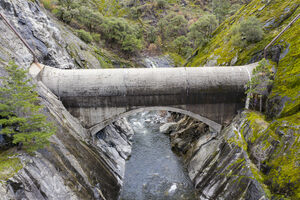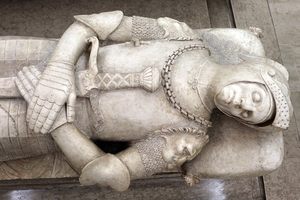Cresta Aqueduct in Oroville, California

At first glance, this structure appears to be an enigma. It’s a bridge between two granite monoliths, an above-ground tunnel, and an aqueduct carrying water over a creek. This structure is actually part of an elaborate water system.
The Feather River Canyon is a scenic wonder. Sheer granite slabs rise hundreds of feet above the water. Almost equally impressive are the measures engineers have taken to conquer this rugged terrain.
Constructed in 1949, the Cresta Power Dam diverts water through a 21,000-foot-long tunnel bored through solid rock. At 12 feet in diameter, this tube delivers water to the Cresta Powerhouse four miles downstream. The elevation drop of 290 feet allows this system to generate 70 megawatts of electricity.
The Cresta Aqueduct allows water to pass over the gap created by Grizzly Creek, and it is the only portion of the Cresta tunnel system visible.
Pacific Gas and Electric (P.G.&E.) operates several similar dam and powerhouse projects along the Feather River. Collectively they are known as the “Stairway of Power,” as they are able to reuse the same water, over and over, to generate electricity as it flows down the canyon.





